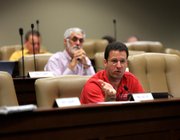Proponents and users of new national education standards told Arkansas lawmakers Tuesday that the standards are no “silver bullet” but are an improvement over the state’s current math and English/language arts requirements and will allow for more in-depth teaching and learning.
On the second day of a two-day legislative hearing on the Common Core State Standards, a stream of speakers that included Arkansas Education Commissioner Tom Kimbrell; leaders of state teacher, superintendent and school board organizations; representatives of business and industry; and officers of education policy organizations. The speakers sought to allay concerns and complaints about the standards that critics raised the day before.
Brenda Gullett of Fayetteville, the chairman of the state Board of Education, was one of several to explain that the national standards adopted by the Arkansas board in July 2010 establish what students should know and be able to do at the end of each grade level.
But local school districts, school leaders and teachers will continue to decide what lessons, programs, strategies and materials to use to teach the skills and concepts, she said. Those decisions won’t be made by the federal government or national organizations, she said.
Gullett believes that teaching to the new standards will eventually reduce the number of the nearly 50 percent of Arkansas high school graduates who have to take and pay for noncredit remediation classes when they enroll in state colleges. That will in turn lead to a greater number of Arkansas college graduates and an improved state economy.
“The only people who embrace change are wet babies,” Gullett acknowledged to legislators about the transition to the standards and the accompanying online exams that are scheduled to replace the state Benchmark and End of Course exams beginning in the 2014-15 school year.
But she urged educators and others to “lock arms” and not horns in the efforts to improve student achievement in the state.
Arkansas is among 45 states plus the District of Columbia to adopt the national standards that were produced by committees of subject-area experts organized by the National Governors Association, the Council of Chief State School Officers and Achieve Inc.
Arkansas is also part of a smaller consortium of states that is developing online exams based on the national standards. That is the Partnership for Assessment of Readiness for College and Careers, most often referred to as PARCC.
The new standards are already being used in kindergarten through eighth grade in Arkansas and will be incorporated into the high schools this coming school year.
On Monday, critics told lawmakers that Arkansas’ use of the Common Core standards and the PARCC exams will cede control of the state’s public education system to the federal government or to national, profit-seeking organizations.
The critics, who included some parents, a public school teacher, a retired University of Arkansas faculty member and members of national policy organizations, also argued that the technology for the online testing is costly, student databases will be turned over to federal agencies and the standards are not challenging. More specifically, there were complaints that the English standards rely too heavily on informational text to the detriment of literature.
James Milgram, a professor of mathematics at Stanford University in California, said he objects to the math standards. He told the Arkansas lawmakers Tuesday by telephone that the math standards require students to use nonconventional methods to calculate solutions, and they fall short of what students need to know to be prepared for four-year colleges. However, he also said that the math standards are better than existing state standards in most states, including Arkansas.
Dana Breitweiser, English/ language arts assessment specialist, and Thomas Coy, mathematics content leader, both from the Arkansas Department of Education, described for the lawmakers Tuesday how they brought in Arkansas teachers to draw comparisons between the new standards and the existing state standards so that teachers statewide could see the differences and fill in the gaps with new lessons.
Coy said the math standards don’t prescribe any particular method for solving problems.
Breitweiser said the new standards require students to read material that has a level of complexity appropriate for their grade level - a feature lacking in the state’s own standards.
The new standards also call for teachers of science and social studies to require informational reading in their subject areas - another feature missing from the state’s own standards. Breitweiser said “it is not the case” that the new standards neglect classic literature.
Kathy Powers, a former state Teacher of the Year from Carl Stuart Middle School in Conway, praised the new standards used in her fifth and sixth-grade English/language arts classroom. She said the standards “raise the bar” for student learning and that her pupils now must “read like detectives and write like reporters” in their efforts to process the information they read and present. She said she looks forward to the new technology and the opportunity to share teaching ideas with teaching colleagues in other districts and states.
Sen. Jason Rapert, R-Conway, told Kimbrell that he understood that there are “a lot of good things” about the Common Core. “President [Barack] Obama saying it is a good thing doesn’t make it all bad,” he said, and asked whether the standards are likely to become federally mandated.
Kimbrell said that the new standards are Arkansas’ to change as state leaders see fit but that the changes made in Arkansas may not be tested on the PARCC exam. He noted that the standards have been copyrighted as a protection against any textbook companies that might attempt to do the same.
In response to Rep. Stephen Meeks, R-Greenbrier, Kimbrell agreed to seek a written copyright waiver for the state.
These are the state’s standards, Kimbrell said, and the state Education Department is working hard on its existing budget to provide teachers the training and the other resources they need to be successful in working with their students.
He disputed a comment by Rep. Randy Alexander, R-Springdale, that the state’s public-school system is“broken.” But Kimbrell also said there are some schools of which he is not proud. Without the standards and resources to carry out the standards, those schools will lose another generation of students, he said.
Kimbrell told the lawmakers that the state Education Department does not and will not collect student data regarding family income or religion that might go to the testing consortium, but he did say other state agencies do collect that type of data.
Sen. Johnny Key, R-Mountain Home, asked Kimbrell to compile what Kimbrell said was an extensive list of Education Department efforts over the past three years to inform educators and the public about the new standards.
Key, who read aloud a letter of support for the new standards from former Gov. Mike Huckabee, told the crowd attending Tuesday’s meeting that the legislative committees’ purpose was simply to get information about the standards. The committees do not have the authority to take action one way or another on the standards, he said, but the information could be used later when Legislature is in session. The next regular legislative session - a fiscal session - will be in early 2014.
Michael Petrilli, executive vice president of the Thomas B. Fordham Institute, a self-described “right of center policy think tank” in Washington, D.C., was among those speaking in support of the national standards Tuesday.
He urged them to “stay the course” with the Common Core, which he said is “pegged at a high level” and will bring “a healthy dose of reality to the education-reform conversation,” which will be painful but serve children well.
Gary Ritter, director of the office for Education Policy at the University of Arkansas at Fayetteville, told the committees that the standards are not a panacea for all of the ills in education but “a move in the right direction.”
Front Section, Pages 1 on 07/24/2013


